#Mekorot
Text
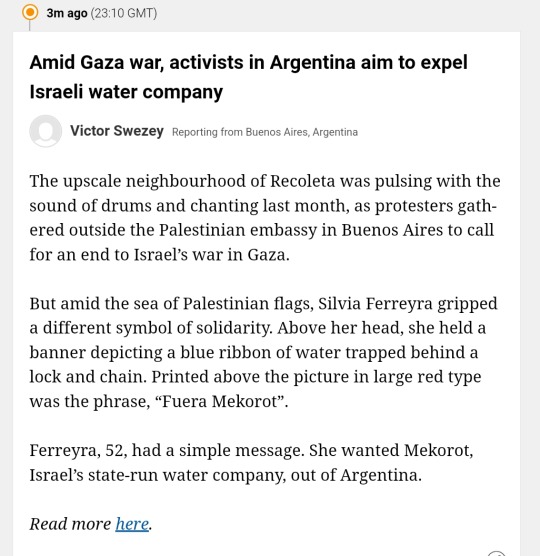
Activists seek to oust Mekorot, an Israeli water company, from Argentina
Full article here:
#free gaza#free palestine#gaza strip#irish solidarity with palestine#palestine#gaza#news on gaza#al jazeera#boycott israel#israel#Argentinian Solidarity with Palestine#Argentina#Mekorot#Silvia Ferreyra#Recoleta#Buenos Aires
328 notes
·
View notes
Text
by John Jeffay
Workers chanced upon the oldest city gate in Israel during excavations to lay a new water pipe.
The stone and mudbrick structure formed part of the fortifications around the ancient city of Tel Erani, in southern Israel, and is believed to be 5,500 years old.
Archeologists have spent many decades exploring the area, but the new discovery indicates the city dates back even earlier than originally thought.
Remains of the gate were found during test drillings to prepare for the laying of a new 11-kilometer water pipeline to the nearby city of Kiryat Gat.
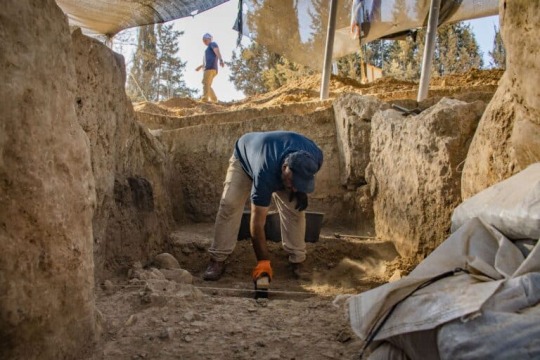
Mekorot, the national water company, has diverted the pipeline as a result of the find, and has been funding a month-long excavation by the Israel Antiquities Authority (IAA).
Before the Tel Erani discovery, the oldest known gate in the country was at Tel Arad, near the southern city of Arad, and estimated to be 5,200 years old.
The Tel Erani gate, or passageway, was built into the city’s heavily fortified walls, which were up to eight meters thick.
12 notes
·
View notes
Text
#Argentina dice #FueraMekorot.
#HOY, #viernes #14DeJulio, a las 2:30 pm había una #Audienciapública en el #Congreso de la #Nación. Aquí se puede seguir 👇🏾
¡#FUERAMEKOROTDEARGENTINA!
#ElAguaValeMasQueTodo
#Argentina#Hoy#Viernes#14DeJulio#Ahora#Agua#Mekorot#Israel#Palestina#AudienciaPublica#Congreso#CongresoNacional#CABA#ElAguaValeMasQueTodo#FueraMekorot#FueraMekorotDeArgentina
0 notes
Text

#XIX Europe#ethnically clean state ideology#Presence of gypsies and juish populations in Europe hampers the ethnically pure state ideology (XIX colonialisms)#hegemonic hate against juish#pogrom#Sionism created in Vienne´s Bourgoisie#theodor herzl#1897#“We will create an ethnically clean colonial juish state!”#BUND: juish revolutionary workers against sionism#religious juish against sionism#Balfour#christian sionist#proud of the declaration: juish out!#1905: speech and law against revolutionary juish#1917: Declaration#1933: Havaara agreement between Nazis and Sionists#60 000 juish out of Germany#Palestine#sionist institutions created before WWII !#1901: KKL juish national funds#1922: INSTADRUM sindicate#1937: MEKOROT#1921: SOLEBONE#APOALIM#Palestinian pay for European Antisemitism#Europe never opened its borders and states to juish after WWII#Antisemite Sionists´s dollars#today 40 milion of Christian Sionists in US#colonialism
14 notes
·
View notes
Text
While Palestinians have gone thirsty, Israelis had more than enough water to go around. The daily supply to Israelis and Jewish settlers is three to five times greater than to the average Palestinian household, whose consumption is almost 30 percent below the minimum amount recommended by the World Health Organization. Since they are all connected to Israel’s water network, the settlements have access to unlimited and highly subsidized resources; they can always fill their swimming pools and irrigate their vineyards, even during the region’s scorching summers.
Under the 1995 Oslo Accords, Israel is entitled to siphon off a full 80 percent of the West Bank’s groundwater and 100 percent of the surface water from the Jordan River Basin. The limited allocation of 15 percent to the Palestinian Authority (PA) has not accommodated the massive growth in population in the Occupied Territories, which today is home to 75 percent more residents than at the time of the Accords’ signing. Mekorot, the Israeli water company, controls almost all of the distribution, and its monopoly ensures that water does not flow anywhere without its say-so. Not unpredictably, this stark power to turn on and off the tap is being used to accelerate the rate of Jewish settlement: without steady access to water in their villages, rural Palestinians are being pushed off their land and into the overbuilt and overcrowded cities.
507 notes
·
View notes
Text
To drive through the West Bank is to pass through a nature-scape of browns, oranges and reds. It’s rolling hills scattered with wild olive tree groves and crop rows, and views of sprawling cities in the distance, slightly obscured by the blur of a faint haze. That backdrop changes suddenly when confronted with an Israeli settlement. Desert shades are swapped for emerald greens, and olive trees for pine. Swaths of farmland suddenly host swimming pools and soccer fields, and dry farmland dry becomes lush greenery.
This jarring polarity is a constant reminder of the Israeli occupation, says Fokha, whose village of Tubas is encircled by such settlements. “They have all these things, and we’ve been stripped of our way of life,” he says. “All I want is enough water to sustain my family and my land.”
It’s also the most effective way to permanently damage the Palestinian food system, say multiple experts.
Given the dry conditions, water access long been weaponized in the conflict. So much so, that the Oslo Accords sought to address it. It stipulated that for an interim period of five years, Israel would gain access to 80 percent of the water pumped from the West Bank and Palestinians would get the remaining 20 percent. It also limited the amount of water Palestine could drill from the shared mountain aquifer, while allowing Israel unlimited access, and required Israel sell a pre-determined amount of water to Palestinians annually. B’tselem calls what’s transpired since a “largely manmade” water shortage that allows Mekorot, the state-run Israeli water company, to control the entire grid, giving preferential access to settlers while while hundreds of thousands of Palestinians live without for weeks every year.
Palestinian farmers all over the West Bank can no longer survive as a result. Fokha, who has been working the same land since he was 18 years old, only gets enough access to water to grow for one season—August to March—which halves his yield. The soil’s suffered from the droughts, so it can no longer grow watermelon, potatoes, and certain types of cucumber, he says. Yosef Salmon has been a farmer in Beit Jala, an area outside of Bethlehem, for nearly 45 years. He says there used to be five water springs in the Makhrour Valley. Today, he can access only one, he says. His neighbor, Basem, who asked to keep his last name private, couldn’t irrigate half his crops last year, so he lost money and couldn’t live off the anticipated harvest. “Without water, we can have no progress. Without water we can’t do anything. It is life,” Basem says.
—Carly Graf, "Food Is the First Frontier of the Israeli-Palestinian Conflict," 2019.
176 notes
·
View notes
Text

5500-Year-Old City Gate Unearthed in Israel
The Israel Antiquities Authority announced on Tuesday that archaeologists have discovered the earliest known ancient gate in the land of Israel, at Tel Erani, near Kiryat Gat Industrial Zone.
The Tel ‘Erani was fortified in the Early Bronze I period, more than 5,000 years ago, and was one of the major economic and commercial centers of this period in the southern Levant.
The ancient city of Tel Erani is one of the first examples of urbanization in Israel and the gate’s discovery indicates that urbanization in the region occurred centuries earlier than believed.
Previously, experts had believed that urbanization in this area had started around 5,200 years ago, which was the age of the oldest known gate in Israel. Until the current discovery, the oldest gate to a fortified city was in Tel Arad, near Beersheba. But the dating of the Tel Erani gate pushes the evidence of the start of urbanization back by a number of centuries, to around 5,500 years ago.
Prior to laying a water pipe, the Israel Antiquities Authority conducted an excavation funded by Mekorot, Israel’s national water company, over the last month. During this excavation, a gate and part of an ancient city’s fortification system dating to the Early Bronze IB, approximately 3,300 years ago, were discovered. These structures reflect the beginning of urbanization in the Land of Israel and the Southern Levant.
The Tel Erani gate, which was preserved at a height of 1.5 m, is comprised of a passageway built of large stones that leads into the ancient city. Two towers made of large stones flank the gate, and between them there are rows of mudbricks. This gate is attached to the city walls that were uncovered in previous excavations.
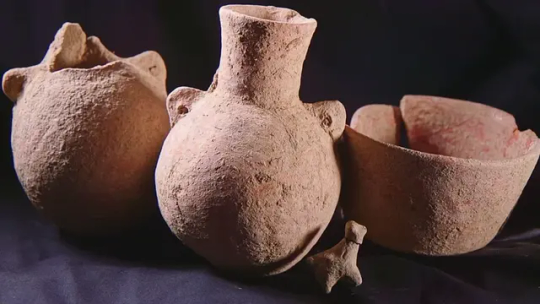
According to Emily Bischoff, Director of the excavation on behalf of the Israel Antiquities Authority: “This is the first time that such a large gate dating to the Early Bronze IB has been uncovered. To construct the gate and the fortification walls, stones had to be brought from a distance, mudbricks had to be manufactured and the fortification walls had to be constructed. This was not achieved by one or a few individuals. The fortification system is evidence of a social organization that represents the beginning of urbanization.”
“It is probable that all passers-by, traders or enemies, who wanted to enter the city had to pass through this impressive gate,” says Martin-David Pasternak, IAA researcher of this period. “The gate not only defended the settlement, but also conveyed the message that one was entering an important strong settlement that was well-organized politically, socially, and economically. This was the message to outsiders, possibly also to Egypt, where the process that would lead to the unification of the Lower and Upper Egypt under King Narmer was already beginning.”
Pasternak adds that, “At the end of the Early Bronze Age, the Egyptians themselves arrived here and settled the tell, and they reused the gate.”

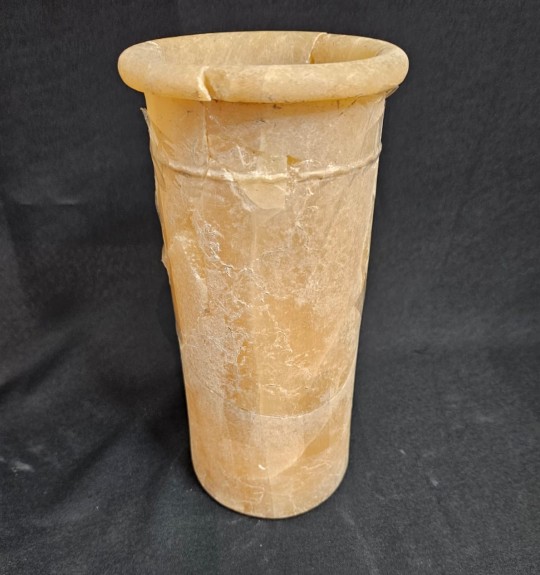
According to Dr. Yitzhak Paz, IAA archaeologist specializing in the Early Bronze Age period, “Tell Erani, which is about 150 dunams in size, was an important early urban center in this area in the Early Bronze period. The tell site was part of a large and important settlement system in the southwestern area of the country in this period. Within this system, we can identify the first signs of the urbanization process, including settlement planning, social stratification, and public building. The newly uncovered gate is an important discovery that affects the dating of the beginning of the urbanization process in the country.”
The extensive excavations carried out by the Israel Antiquities Authority over recent years have led to dating the beginning of urbanization to the end of the fourth millennium BCE, but the excavations carried out at Tell Erani have now shown that this process began even earlier, in the last third of the fourth millennium BCE.
Archaeologists also found a number of interesting smaller discoveries, including a complete alabaster jar, a number of juglets, and red-colored bowls.
By oguz kayra.

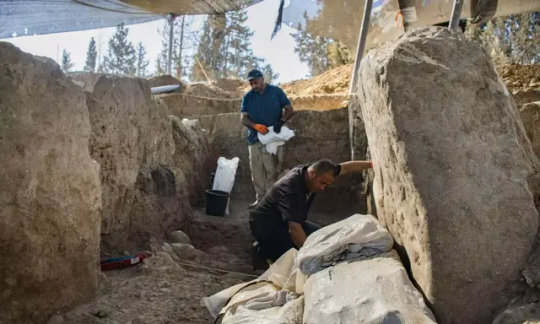
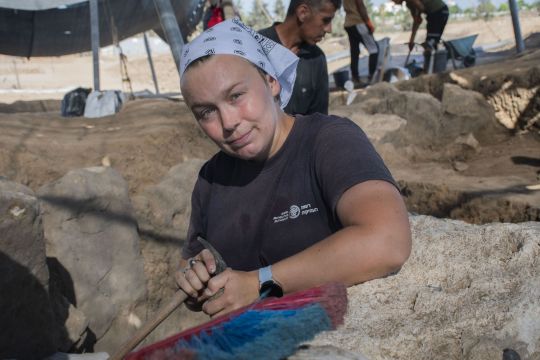

#5500-Year-Old City Gate Unearthed in Israel#earliest known ancient gate#Tel Erani#ancient artifacts#archeology#archeolgst#history#history news#ancient history#ancient culture#ancient civilizations#ancient israel#israeli history
111 notes
·
View notes
Text
Ending Water Apartheid In Palestine.
Article Date: April 8, 2024.
Article Excerpt:
According to Euro-Med Monitor, those in the Gaza Strip have access to just 1.5 liters of water per person per day for all needs, including drinking, cooking, and personal hygiene. The established international emergency water threshold is 15 liters per person per day—ten times what Gazans have now. At least 20 people have already died of dehydration and malnutrition, a number that will continue to rise as diarrheal disease spreads due to lack of clean water, leaving many unable to retain what few calories they ingest.Despite significant investment in water and wastewater infrastructure in Palestine from institutions like the World Bank and the United States Agency for International Development (USAID), Palestinian per capita water consumption continues to fall. While the water crisis in Gaza is now catastrophic, the Palestinian struggle to access water long predates the current onslaught and is an issue in the West Bank, too.
[...]
The root cause of Palestine’s water crisis is not a lack of investment but the political reality that Israel, as an occupying power, manages water in a way that denies Palestinians fair access. Experts and rights groups call this “water apartheid.” They say that recent Israeli tactics in Gaza, such as cutting off water to the enclave, are just the latest examples of its weaponization of the vital resource.
“Water apartheid describes a form of segregation that results in unequal access to water, where policies and practices ensure that water resources are disproportionately allocated to privileged groups while marginalized communities face scarcity and denial of access,” explains Saker El Nour, a sociologist and co-founder of Water Justice for Gaza, a collective of researchers and activists that publishes a newsletter on water in Palestine.
[...]
In Gaza, as early as 2017, UNICEF estimated that 96% of the water from the enclave’s sole aquifer was unfit for consumption due to untreated wastewater and seawater pollution. Still, before Israel’s October 2023 invasion, the aquifer provided over 80% of Gaza’s water, with three desalination stations and three pipes from Israeli company Mekorot providing the remainder.
[...]
“There is a segregationist thing of investing in water infrastructure for the settler population, allowing them to dig deeper wells to pull out more water, and constraining the Palestinian population, not letting them invest in improvements in their water infrastructure,” explains Michael Mason, director of the Middle East Center at the London School of Economics.
[...]
“Development aid is just a band-aid put on to make things look good, but it does not necessarily offer a sustainable solution,” she says. “The United Nations or USAID, for example, could spend a hundred million pounds to build a big water treatment plant, but then it gets bombed and that’s it—nothing is protected.”What is needed instead, Zaqout says, is an end to Israel’s control over Palestinian resources and its attacks on infrastructure and autonomy for Palestinian decision-makers to “think about their water needs, design their own infrastructure, and manage and decide on how they want to allocate funds.”
Mason says that the political pressure needed to push governments like those of the United States and the United Kingdom toward withholding support for Israel’s occupation could come from international courts and rights groups. Many of these are already spotlighting Israel’s weaponization of water.
28 notes
·
View notes
Text
🚨 Head of the Government Media Office in Gaza, Salama Maarouf:
—
Gaza City is facing a new environmental disaster that threatens the citizens, adding to a series of disasters caused by the occupation to the Gaza Strip since the onset of its brutal aggression. This disaster is represented by the complete halt of all water wells in the city for the past two weeks due to the depletion of the scant fuel supplies that were available to the Gaza Municipality during the previous period.
With the municipality teams unable to operate the water wells that survived the barbarity and bombing of the occupation, the entire city is now experiencing severe thirst due to the water cut-off, especially with the continued stoppage of water pumping from the "Mekorot" line since the beginning of the aggression and the complete destruction of the desalination station, more than 40 water wells, and 120,000 linear meters of water networks in the city.
This crisis has currently reached its peak with the onset of rising temperatures and increased demand and consumption, which requires urgent intervention from all relevant parties to provide fuel and urgently restore water supply to the citizens, and to save them from severe thirst and the health and environmental crisis that will exacerbate due to the water cut-off.
We call on the international community to put an end to the occupation's crimes against civil service sectors and urge it to urgently move to support the municipalities and provide the necessary equipment and machinery for their operation, especially in light of the heavy burden currently placed on them in serving the citizens and delivering basic services to them, primarily water.
We call for a serious international legal action to investigate all the crimes committed by the occupation army against the municipalities, local councils, and other service institutions, and to take a responsible stance in the face of the continuation of such crimes.
Salama Maarouf
Head of the Government Media Office
Gaza-Palestine
Friday, April 19, 2024
#palestine#free palestine#gaza#free gaza#jerusalem#israel#tel aviv#israeli terrorism#settler colonialism#gaza strip#from the river to the sea palestine will be free#joe biden#benjamin netanyahu#gaza news#news#breaking news#the tortured poets department#taylor swift#water is life#water rights#water#genocide#palestinian genocide#human rights#social justice#stop the genocide#crimes against humanity#united nations#iof#idf
23 notes
·
View notes
Text
Gaza Strip had a population of 1.899 million people living on 365km area The total water supply for domestic use in the Gaza Strip is about
96,308 mcm in 2017as follows:
78.791 mcm from 273 municipal water wells.
2,911 mcm from nine UNRWA wells.
10,566 mcm from Mekorot [water from Israel].
4,039 mcm from desalination plants (Brackish and Seawater).
Looks like we might have been overly worried about the water situation in Gaza, direct water imports and desalination plants only make up about 15% of Gaza's water production.
Don't know how dependent on electricity the functioning of the wells is though... and this is 5 years out of date, the Palestinian aquifer has been having major issues with saltwater infiltration so a significant portion of the wells may have been knocked out since then.
@official-kircheis
34 notes
·
View notes
Text
Geneva - The catastrophic lack of clean drinking water sources in Gaza City and the northern areas of the Gaza Strip has left Palestinians there facing a horrifying tragedy akin to a death sentence, Euro-Med Human Rights Monitor said in a statement issued Monday, citing the war crime as further evidence of the genocide Israel has been carrying out against the Strip’s civilian population since 7 October 2023.
Distress is engulfing Gaza City and its northern regions in alarming ways—a result of Israel’s cutting off of the water supply in the Gaza Strip, systematic and intentional Israeli bombing of water sources and wells, and a lack of fuel required to run water conversion and distribution facilities, said Euro-Med Monitor.
The human rights organisation warned that the lack of drinking water in the Strip has become a matter of life and death. It noted that residents are currently forced to drink unclean well water, which is contributing to the spread of transmitted and infectious diseases, especially amid the power outage and overall water supply shortage.
Prior to Israel’s 100-day-long genocide, the Gaza Strip—one of the world’s most densely populated areas—was already experiencing a crippling crisis in clean drinking water supplies. More than 90% of the population, or more than 2.3 million people, were living in a declining economic environment with the barest necessities.
Gaza City’s main reservoirs, Al-Balad and Al-Rimal, were completely destroyed last weekend during an Israeli bulldozing operation in the area, the Euro-Med Monitor team confirmed. Al-Balad Reservoir, which houses a water well, a warehouse for water line maintenance equipment, and administrative offices for the city’s water department, and Al-Rimal Reservoir, which includes the sanitation department’s offices and a warehouse for sewage network maintenance equipment, have both been bulldozed during the Israeli ground incursion.
According to the Palestinian Water Authority, the ongoing Israeli military attacks have destroyed the water infrastructure in the Gaza Strip, including at least 65% of the water wells in Gaza City and the northern areas of the Strip.
Due to Israeli bombing, at least 12 wells in the area have been destroyed, resulting in an extreme and unprecedented water crisis in Gaza City. Prior to the Israeli military attacks on the Gaza Strip on 7 October, the Gaza municipality was pumping approximately three million cups of water per month. Israel’s state-owned Mekorot company provided 700,000 cups per day, or 25% of the total amount. The desalination plant provided 10%, and the city’s local wells provided roughly two million and 200,000 cups. Almost all of these sources have since ceased production.
The situation is made worse by the fact that the Israeli authorities are still placing tight restrictions on the flow of aid into the Gaza Strip, particularly into the northern areas and Gaza City; this includes the fuel needed to run the water and sanitation facilities.
Since the beginning of its unprecedented military assaults, Israel has imposed a complete blockade on the Gaza Strip and stopped the flow of food, fuel, water, and other basic human necessities. Later, Israel’s military began methodically and willfully destroying water tanks and stations.
Under international pressure, Israel has allowed the daily entry of 100 aid trucks into the Gaza Strip via the Rafah land crossing into Egypt. This is a far cry from the average load of 500 trucks that entered the Strip prior to 7 October to meet humanitarian needs.
According to Euro-Med Monitor, the lack of clean drinking water in the northern Gaza Strip is resulting in increasingly dire consequences and severe suffering for residents of the Jabalia refugee camp, who have not had access to it since the start of Israeli military attacks. A 73-year-old resident of the camp’s “Block 4”, Alian Fares Abdel-Ghani, told the Euro-Med Monitor team that residents are forced to drink salted water, which is necessary for daily survival but difficult to obtain. According to Abdel-Ghani, Israel’s army destroyed the camp’s two desalination plants, the Tiberias and the Shomer plants, shortly after the start of its ongoing attacks.
Abdul-Ghani stated that the cost of a gallon of water initially increased from one Israeli shekel ($0.27 USD) to four shekels ($1.08 USD) as a result of the Israeli bombing and the lack of fuel required to run other stations farther from the camp. After a few days, he continued, Israel shut off the water supply entirely. Many Jabalia families have tried to sterilise water and make it somewhat drinkable by boiling it over wood fires, he said, especially after diseases started to spread among them and children started getting diarrhoea and colic on a regular basis.
Euro-Med Monitor warned that excessive consumption of undrinkable salt water will lead to high blood pressure; kidney disease; increased risk of stroke, intestinal, and stomach diseases; constant vomiting; and diarrhoea. These side effects ultimately result in excessive dehydration of the body’s tissues, particularly brain tissue. Drinking water drawn from wells without treatment could result in an imbalance in the body’s salt content and cause dehydration, with children and elderly people being the most vulnerable due to weakened immune systems, and the potential for gastrointestinal infections to cause fatalities.
Given the scarcity of drinkable water, particularly following winter rains and floods, worries about waterborne and infectious diseases like cholera and chronic diarrhoea are high.
Euro-Med Monitor conducted an analytical study last month that included a sample of 1,200 people in the Gaza Strip in order to ascertain the impact of the humanitarian crisis experienced by residents of the enclave in the midst of Israel’s genocidal war, ongoing since 7 October. Sixty-six per cent of the study sample reported having experienced diarrhoea, skin rashes, or intestinal diseases within the past month. According to the study, the rate of access to water in the Strip, including drinking, bathing, and cleaning water, is just 1.5 litres per person per day. This is 15 litres less than the minimum amount of water required for survival at the level required by international standards.
Euro-Med Human Rights Monitor stressed that international humanitarian law forbids attacks, destruction, or disruption of vital facilities necessary to the survival of the civilian population, such as drinking water facilities and networks. The rights organisation further emphasised that international humanitarian law strictly prohibits the use of starvation as a weapon. As an occupying power, Israel is obligated under international humanitarian law to provide basic needs and protection to the Gazan people.
The Rome Statute of the International Criminal Court provides that intentionally starving civilians by “depriving them of objects indispensable to their survival, including willfully impeding relief supplies” is a war crime, added the Geneva-based rights group.
Euro-Med Monitor stated that Israel has been committing acts of genocide against the civilian population of the Gaza Strip since 7 October according to the Rome Statute of the International Criminal Court, the Convention on the Prevention and Punishment of the Crime of Genocide, and pertinent international judicial rulings. Israel’s crimes include depriving the civilian population of enough potable water, which has caused serious, intentional harm and trapped them in living conditions meant to destroy them.
#palestine#free palestine#save palestine#gaza#save gaza#free gaza#world news#current events#war on gaza#gaza strip#gazaunderattack#gaza genocide#ceasefire#palestinian genocide#israel#israel palestine conflict#israeli apartheid#humanitarian crisis#ceasfire now#stop the genocide#genocide
3 notes
·
View notes
Text
Palestine's water is under attack!
"Water is a fundamental element of human life."
FULL REPORT:
https://whoprofits.org/wp-content/uploads/2023/06/Dried-Up-Mekorot-Report.pdf
ARABIC:
https://whoprofits.org/flash-report/%d9%85%d8%b9%d8%b7%d9%91%d8%b4%d9%88%d9%86-%d8%b6%d9%84%d9%88%d8%b9-%d9%85%d9%83%d9%88%d8%b1%d9%88%d8%aa-%d9%81%d9%8a-%d8%a7%d9%84%d8%a7%d8%ad%d8%aa%d9%84%d8%a7%d9%84-%d8%a7%d9%84%d8%a5%d8%b3%d8%b1/?fbclid=IwAR2SPswuRtdO27vdItJoOYlyvzv-zesHit5_duLB-kEP6SPh0sqZNK6e3Uk
4 notes
·
View notes
Text
Sirens sounded Saturday morning in Israeli cities and towns throughout the Jerusalem area, central Israel, and southern Israel, prompting the IDF to declare "Operation Swords of Iron."
Multiple civilians reported hearing loud explosions in their immediate vicinity; as of 7:30 PM on Saturday, at least 3,000 rockets had been fired toward Israeli civilians.
Parallel to the rocket attacks, hundreds of terrorists infiltrated multiple Israeli communities, overtaking Israeli towns on the Gaza border, murdering Jews, and taking others back to Gaza as captives. At least 700 were killed, dozens were kidnapped, and over 2000 were injured in the attacks.
In response to the attacks, the IDF launched Operation Swords of Iron and has since been striking terror targets in the Gaza Strip.
Live Updates:
Monday, 2:48 p.m.: A diplomatic source has denied the Reuters report claiming that talks regarding a possible prisoner swap between Israel and Hamas "are moving in a positive direction."
"There are no negotiations," the source said.
Monday, 2:31 p.m.: Qatar is brokering negotiations between Hamas and Israel regarding a prisoner swap between, Reuters reported, quoting sources. The swap would include the release of women and children kidnapped by Hamas on Saturday, in exchange for the release of 36 Palestinian Arab women and children held in Israeli prisons.
Monday, 2:20 p.m.: Israel's Health Ministry has reported that 2,506 injured Israelis have been evacuated to hospitals since the start of the fighting. Currently, 578 victims are hospitalized, among them 157 who are severely injured, 259 who are moderately injured, and 161 who are lightly injured.
Monday, 1:57 p.m.: Energy Minister Yisrael Katz (Likud) has instructed the Mekorot company to immediately disconnect the water supply to the Palestinian Authority in Gaza.
Katz acted to receive the necessary permits to disconnect the supply of water from Israel to Gaza, and upon receipt of the approval, ordered the disconnection to immediately take place. Electricity and fuel supplies were cut off on Saturday. Katz has emphasized that his decision will remain unchanged until the war has ended, saying, "What was, will no longer be."
Monday 1:50 p.m.: Additional sirens sound in Rishon Lezion and Holon
Monday 1:20 p.m.: Al Jazeera is reporting that at least 50 people were killed in an Israeli strike on the Jabalya "refugee" camp.
Monday, 12:44 p.m.: Direct hits have been reported in Ashdod and Ashkelon. In Ashdod, at least one woman suffered serious injuries from a rocket. A direct hit has been reported on a home in Sderot, though no one was reported injured.
There are also reports that homes near the Gaza border have been booby-trapped with explosives.
Monday, 12:32 p.m.: Sirens sound in Rishon Lezion, Holon, Yavne, Sderot, Bnei Darom, Ashdod, Palmahim, and other areas in central and southern Israel.
Monday, 12:25 p.m.: Defense Minister Yoav Gallant is holding a situational assessment at the Southern Command, alongside its commander, Major-General Yaron Finkelman.
"I have ordered an immediate closure of the Gaza Strip," Gallant said. "There will be no electricity, no food, no gas - everything is closed. We are fighting animal-like people, and we will act accordingly."
Monday: 12:00 p.m.: Heavy missile bombardment on locations in central Israel, including Tel Aviv and Jerusalem.
MDA responded: "In response to the recent alarms sounded throughout Israel, Magen David Adom teams have been dispatched to reported impacted sites. As of now, there are no known casualties. Further updates will be provided as necessary."
Monday 11:56 a.m.: IDF forces have thwarted a terrorist who is in the Kfar Aza area. Shootouts between terrorists and Israeli forces are ongoing.
Monday, 11:48 a.m.: There is a suspicion that aerial vehicles have infiltrated the Gaza border area. Parallel to this, a gunfight with terrorists is taking place in Kfar Aza.
Monday, 11:24 a.m.: An IDF spokesman told journalists: "We are in complete control in the towns. It could be that there are still terrorists in the area." He added: "We have moved to offense; hundreds of Hamas terrorists have been killed in the border region."
Monday 10:10 a.m.: A terrorist was stopped by IDF soldiers attempting to infiltrate the Zikim military base near the Gaza border. No Israelis were hurt.
Monday 9:24 a.m.: The Paratroopers Brigade is working to cleanse Sderot of terrorists.
Monday, 9:09 a.m.: There is a concern of a potential hostage situation in Sderot. There are also clashes with terrorists at a junction near Sderot; residents of the city are requested to remain in their homes.
Monday, 8:16 a.m.: The Health Ministry has reported that 2,382 people have been injured since the start of the war, and 22 of them are currently in critical condition.
Monday, 7:00 a.m.: According to the IDF, there are currently six active points of engagement between IDF soldiers and terrorists in the Gaza periphery.
Monday, 6:32 a.m.: Additional sirens sounded in Kibbutz Nir Oz. The IDF is investigating.
Monday, 6:20 a.m.: Sirens sounded in the Gaza envelope region as rocket fire resumed.
Monday, 5:58 a.m.: Bursts of gunfire were heard in Sderot as a result of a battle between three terrorists and security forces at the Gevim intersection.
Monday, 5:00 a.m.: Gunfire was heard near Sderot, and security forces were dispatched to the area.
Monday,3:38 a.m.: The IDF targeted a structure that housed Hamas terrorists and other Hamas structures.
Sunday, 11:52 p.m.: The Ministry of Health has updated that 2315 injured Israelis were taken to the hospital, among them: 23 were in critical condition, 340 were in serious condition, 449 were moderately hurt, 1233 were light, 56 were in a state of panic, and 202 had yet to be evaluated.
Sunday 11:45 p.m.: In the past hour, an Israeli missile ship struck three missile launch sites in the Gaza Strip.
Sunday 11:39 p.m.: Missile sirens sound in central Israel towns of Rishon Lezion and Nes Tsiona.
Sunday 11:30 p.m.: Approximately an hour ago, an Israeli military aircraft stopped a terrorist who attempted to cross the border fence from the Gaza Strip into Israeli territory.% buffered
00:00
00:00
00:05
https://imasdk.googleapis.com/js/core/bridge3.594.0_en.html#goog_1690545520סיכול מחבל שחדר לישראלדובר צה"ל
Sunday 11:10 p.m.: Senior Hamas official Musa Abu Marzuk told al-Ghad that his organization is holding more than 100 Israeli captives, including senior officers. This would appear to be in addition to the 30 captives the Palestinian Islamic Jihad claimed to have taken.
Sunday 11:00 p.m.: CNN is reporting that at least three US citizens were murdered in the attack by Hamas on Saturday.
Sunday 10:47 p.m.: Israel's Flotilla 13 navy commandos have captured the commander of the southern division of Hamas' naval force, Mohammad Abu Ghali. The suspect is being interrogated by the defense echelon.
Sunday 10:30 p.m.: IDF says dozens of fighter jets struck 150 targets in Shuja'iyya.
Shuja'iyya is used as a "terror nest" for the Hamas terrorist organization. Many attacks against Israel originated in it, including during the recent invasion.
In parallel, terror infrastructure in the residence of Farah Hamed, a senior operative belonging to the Hamas terrorist organization, was targeted. The site was located adjacent to a mosque and three schools, which demonstrates that the Hamas terrorist organization takes advantage of holy sites and civilians to advance terror operations.% buffered
00:00
00:00
00:38
youtube
Sunday 10:00: The ZAKA organization has discovered 260 bodies at the site where terrorists attacked partygoers at a music festival near the Gaza Border.
Sunday 9:32: Kan News reported that IDF soldiers from the Golani Bragaide stopped terrorists while traveling near Urim in the Gaza envelope. The soldiers detained the terrorists.
Sunday 9:25: 10 Downing Street, the official residence of the Prime Minister of the United Kingdom, has been lit up with the Israeli flag in support of the Jewish state.
Sunday 9:20: The Palestinian Islamic Jihad in Gaza claimed that it is holding 30 Israeli captives.
Sunday 8:40: Kan News reporter Amichai Stein reported that the American aircraft carrier USS Gerald R. Ford, which carries approximately 75 fighter jets, is en route to Israel's shores, together with its accompanying fleet.
Sunday 8:00: Heavy missile barrage into southern Israel
Sunday 7:36: The death toll has been updated to 700, 2,156 injured, and dozens are in Hamas captivity in Gaza.
Sunday 7:14: The IDF has released the names of additional casualties.
Sergeant Roi Weiser, 21 years old, from Efrat, a soldier in the 13th Golani Battalion
Sergeant Adir Gauri, 20 years old, from Jerusalem, a soldier in the elite Sayeret Matkal special operations unit
Corporal Ariel Eliyahu, 19 years old, from Mitzpe Yericho, a soldier in Battalion 77, Brigade 7
Sergeant Guy Simchai, 20 years old, from Gadera, a soldier in the paratrooper brigade
Corporal Shira Shohet, 19 years old, from Modi’in Maccabim Re'ut, a spotter in the 414 intelligence battalion
Sergeant Aharon Paresh, 36 years old, from Ofakim, a soldier in the Southern Command
Lt. Shilo Cohen, 24 years old, from Sderot, a soldier in the elite Shaldag airborne commando unit
Major Amir Skori, 31 years old, from Jerusalem, a soldier in Sayeret Matkal
Sergeant Major Ido Rosenthal, 45 years old, from Ben Shemen, a soldier in Shaldag
Major Ariel Ben Moshe, 27 years old, from Kiryat Bialik, a company commander in Sayeret Matkal
Corporal Danit Cohen, 19 years old, from Sderot, a soldier in the Southern District Headquarters
Sergeant Or Mizrahi, 21 years old, from Petach Tikva, a soldier in the Nahal reconnaissance unit
Sunday 7:05: Residents in Kibbutz Miflasim and in the town of Sderot are being ordered not to leave their homes until further notice.
Sunday 6:30: IDF Spokesperson says IDF fighter jets struck 120 terror targets in three rounds in the Beit Hanoun area in the Gaza Strip.
Beit Hanoun serves as a hub for the Hamas terrorist organization in the Gaza Strip, from which many operations against Israel were launched, including over the last two days.
These strikes constitute a significant advancement in the IDF's responsive strikes against the Hamas terrorist organization.
Simultaneously, a Hamas operational terror tunnel was struck. The tunnel was located under a multi-story building in the northern part of Gaza City. A mosque is located adjacent to the tunnel, proving once again that Hamas deliberately embeds its military infrastructure in civilian areas.
Sunday 5:50: Yisrael Beytenu Chairman MK Avigdor Lieberman has announced that if Prime Minister Netanyahu, Defense Minister Gallant, and the IDF Chief of Staff announce that they will eliminate Hamas and its leaders, he will join an emergency unity government without preconditions.
Sunday 5:30: Minister of Defense Yoav Gallant completed a situation assessment focused on Israel's home front, together with Ministry of Defense Director General Maj. Gen. (Res.) Eyal Zamir, Head of of the Homefront Command Maj. Gen. Rafi Milo and additional senior officials in the IDF's Homefront Command and the Ministry of Defense.
Sunday 5:22: Prime Minister Benjamin Netanyahu has appointed Brig. Gen. (Res.) Gal Hirsch to oversee the issue of those being held captive by Hamas.
Sunday 5:10: The Israeli Ministry of Health has updated that 2,156 wounded have been taken to hospitals, among them, 20 are in critical condition, and 338 are in serious condition.
Sunday 5:00: US Secretary of State Antony Blinken says the US is "very actively" working to verify reports that US citizens are among the dead and hostages.
Sunday 4:40: Fox News Will Cain host says Israeli Ambassador to the UN Gilad Erdan told him that there are dozens of American citizens among the hostages in Gaza.
Sunday 4:35: US Secretary of State Antony Blinken says the US has not seen evidence that Iran was behind the attack in Israel.
Sunday 3:55: A diplomatic official told Channel 12 that there are ongoing talks between Egypt and Hamas regarding the release on humanitarian grounds of the elderly and children who are being held hostage in Gaza.
Sunday 3:50: A short time ago, the Israeli Air Force began a fierce airstrike on the Gaza Strip using dozens of planes.
The IDF struck targets near the border fence in Beit Hanoun, which are used by Hamas to carry out attacks against Israel.
Sunday 3:45: Israeli carrier El-Al officially announced that efforts are being made to bring Israelis who are abroad back to Israel.
"We added flights from several locations in the world, and we will continue to add as we can. There are many requests to our service hotlines, and we are doing everything to serve everyone, and we are reinforcing our service hotline constantly."
Sunday 3:00: The death toll has been raised to 600, over 2,048 are injured, some in severe and critical conditions.
Sunday: 2:33 The Political-Security Cabinet officially confirmed that Israel is in a state of war under Article 40 of Basic Law: The Government.
Sunday: 2:30 The death toll was raised again to 500.
Sunday 2:10 The death toll from the Hamas war on Israel officially rose to 400, while the number of injured surpassed 2,000 and now stands at 2,048.
Sunday: 12:00 Security forces pursued a vehicle believed to have been hijacked by terrorists from Gaza towards the north. The terrorists were believed to have a hostage in the vehicle. A shootout occurred during the chase, at the end of which the terrorists were neutralized.
Sunday: 10:13 The death toll from the Hamas war on Israel officially rose to 350.
Sunday: 7:54 Another rocket barrage fired at Tkuma and the Yizre'am Farm area in southern Israel.
Sunday: 7:27 Residents of the north report hearing explosions from rockets fired at Israeli territory from Lebanon in a possible sign that Hezbollah is joining the fighting. IDF responds with artillery fire.
Sunday: 7:26 The police continue to block a number of roads in the south due to the war and have asked drivers not to approach these roads.
Sunday 6:50: IDF spokesperson: "Throughout the night, Hamas targets in highrise buildings were struck in the Gaza Strip.% buffered
00:00
00:00
00:21
youtube
Sunday 6:30: The Israeli Airforce struck the homes of Hamas leaders in Gaza: Yahya Sinwar, Mahmoud a-Zahar, Nizar Awdallah, Fathi Hamid, Issam a-Da'lis. Kamel Abu Awan, and Abu Ma'uiz Sarj.
Sunday 5:20: After nearly an hour and a half of relative quiet, terrorists in Gaza have fired another barrage of missiles into the Gaza periphery.
Sunday 4:35: IDF is striking Hamas terror targets in Gaza.
Sunday 4:25: Security forces have regained control of the Sderot police station, which was captured by terrorists early Saturday morning. 10 terrorists were eliminated at the police station. Authorities in Sderot fear that there are more terrorists at large in the city.
Sunday 4:20: Forces eliminated an additional terrorist who was holed up in a home in Ofakim, the couple that was held hostage was taken to Soroka Hospital in Be'er Sheva.
Sunday 3:50 AM: The Taliban terror organization, which controls Afghanistan, has reportedly asked its neighbors for passage so it could join Hamas in its attack on Israel.
Belarusian news agency NEXTA tweeted: "Russia's allies, the Taliban terrorist organization, supported Hamas: 'If the Muslim countries neighboring Israel grant us the right of passage, we will conquer Jerusalem.'"
Sunday 3:21 AM: Speaking to Al Jazeera, Hamas spokesman Ibrahim Hamad said that the attack on Israel is “absolutely a message” to Muslim countries seeking normalization with Israel. He urged them to absolve themselves of this “great shame.”
Sunday 3:09 AM: MDA EMTs and paramedics are tending to a woman in her 50s who was severely injured from a rocket strike in Ashkelon, five others were lightly injured.
Sunday 3:00 AM: Reports of a confrontation between security forces and terrorists in Kibbutz Be'eri.
Sunday 2:40 AM: The hostage situation at the home in Ofakim has ended. Yamam forces (police special forces) eliminated the terrorists, and the couple that was held hostage were rescued unharmed.
Sunday 2:35 AM: Barzilai Medical Center in Ashkelon sustained a direct missile hit.% buffered
youtube
Sunday 2:30 AM: All areas under the jurisdiction of the IDF Gaza Division have been declared closed military zones. The IDF has clarified that entry of civilians into the area is strictly forbidden.
Sunday 2:25 AM: Security forces are breaching a sieged house in Ofakim.
Another heavy missile barrage on southern Israel.
Police are now saying there are five terrorists holding the police station in the town of Sderot.
Sunday 2:23 AM: US Secretary of State Antony Blinken spoke with Saudi Foreign Minister Faisal bin Farhan.
According to the Saudi Foreign Ministry, during the call, the two discussed "developments in the unprecedented situation in Gaza and its surroundings and the necessity to work to immediately stop the escalation, stressing the kingdom's rejection of targeting civilians in any way and the need for all parties to respect international humanitarian laws."
The Saudi Foreign Ministry added that the Minister stressed the need for "joint efforts to calm the situation and to avoid further violence."
Sunday 2:15: Another heavy missile barrage on southern Israel
Sunday 2:10 AM: Israeli Ambassador to the UN Gilad Erdan remarked on the attack: "Today is Israel’s 9/11 moment. Life for us will never be the same after today’s vicious terror attacks by Hamas terrorists. 250 murdered Israelis is the equivalent of over 8,000 Americans. When we say never again, never again is now. May God bless the State of Israel."
Sunday 2:00 AM: According to Israeli estimates, there are approximately 100 Israelis being held captive in Gaza, among them civilians, soldiers, and officers.
Sunday 1:54 AM: The IDF Spokesperson's Arabic language desk has sent a message to the residents of the Gaza Strip stating: "For your security, you must leave your homes at once."
Sunday 1:00 AM: It was reported that the hostages held in the Kibbutz Be'eri cafeteria were freed. At the same time, it was reported that four hostages were being held in Ofakim. It is not clear if these are the same hostages previously reported.
Sunday 12:30 AM: Hamas has claimed that it has a much larger number of Israeli captives than what Israel believed.
A spokesperson for Hamas' military arm said, "The number of Israeli captives is several times higher than what Netanyahu believes. They have been spread through all of the roads in Gaza, and they will go through what the population in the Strip is going through."
Saturday 10:30 PM: US President Joe Biden spoke with Jordan's King Abdullah following his conversation with Israeli Prime Minister Benjamin Netanyahu.
Saturday 10:00 PM: Bulldozers began demolishing the police station in Sderot, while a terrorist was holding out inside. Later, the terrorist escaped the police station.
Saturday 9:00 PM: sirens sounded in Rishon Lezion, Beit Dagan, Holon, Ganot, and Mishmar Hashiva.
Saturday 8:00 PM: Air raid sirens were activated in Ness Ziona, Rehovot, Herzliya, and various other communities. Less than ten minutes later, a second barrage was fired toward Ramat Gan, Kfar Chabad, Yavne, Rishon Lezion, Tel Aviv, and other areas. Magen David Adom reported hits and injuries in Yavne, Givatayim, Bat Yam, Beit Dagan, Tel Aviv, and Rishon Lezion.
Three people were seriously injured by one of the barrages on central Israel. At the same time, a building in Bat Yam was reported hit by the barrage; no one was injured, but damage was caused.
Following this, the IDF reported that it is striking a number of targets belonging to the Hamas terrorist organization in Gaza.
credit: דובר צה"ל
The barrages were fired as Jews around Israel celebrated the Simchat Torah holiday, and in many cases disrupted the holiday prayer services.
Israel's Health Ministry reported that 1,104 injured Israelis have been evacuated to hospitals. Of these, 17 are in critical condition, 200 are in serious condition, 226 are in moderate condition, 451 suffered only light injuries, 11 suffered shock, and 142 are being evaluated.
A government meeting was interrupted by the rocket fire on Tel Aviv but resumed following the barrage. It has since concluded.
It was later reported that the IAF continued its attacks on targets belonging both to Hamas and to Islamic Jihad.
11 notes
·
View notes
Text
#Agua
Muchos países (Entre ellos #Brasil, #Chile y #Mexico) son #víctimas de #gobiernos #corruptos y del #sionismo #genocida de #Israel vía #Mekorot.
Los últimos en sumarse son #Argentina y #Uruguay.
Sin embargo ésto lo llevan #padeciendo hace décadas en #Palestina.
Video 👇🏾
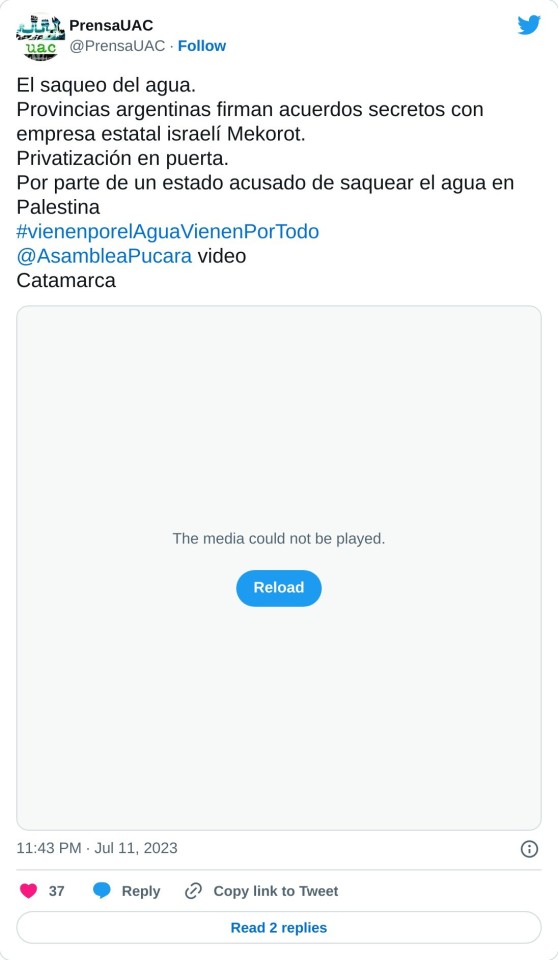
#Agua#Brasil#Chile#Mexico#Argentina#Uruguay#Corrupción#Gobiernos#Sionismo#Genocida#Israel#Mekorot#Palestina#Padecimiento#Apartheid#Corruptos
0 notes
Text
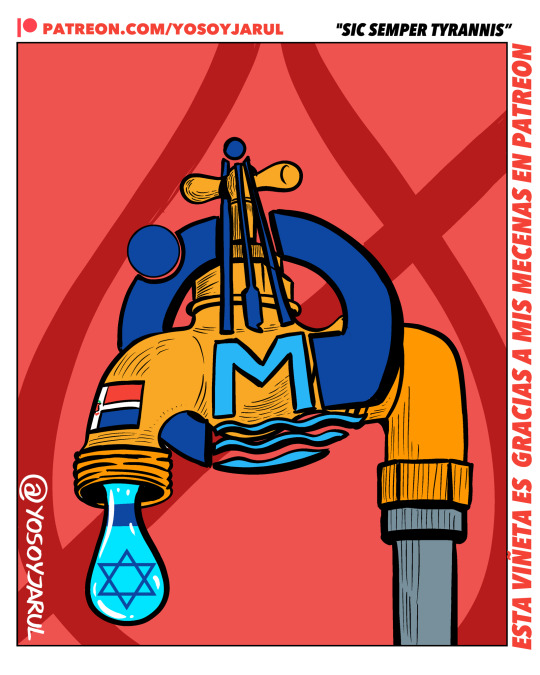
NO ES SEQUÍA ES SAQUEO
Mientras el pueblo está atento al Mayor y a Dilon Baby, Abinader firmaba el lunes pasado EL PLAN MAESTRO PARA LA GESTIÓN DEL AGUA DE REPÚBLICA DOMINICANA un acuerdo con MEKOROT ISRAEL NATIONAL WATER CO. 🙃 y así, entre distracciones, próximamente llegará el pacto del agua para privatizar el único recurso esencial para la vida.
Mekorot, también conocida como el “Apartheid del agua” limita el consumo de agua en Palestina: Israel controla todos sus afluentes a través de Mekorot, que recorta el suministro en verano, niega el acceso a las riberas del Jordán, militariza la zona y destina el 83% de los recursos hídricos a su abastecimiento, sometiendo a los palestinos a la sequía, al agua contaminada y cobrando el poco suministro que distribuyen en la zona a precios exorbitantes.
Mekorot fue denunciada por la ONU, el Comité Nacional Palestino, asambleas ecologistas y grupos parlamentarios a causa del apartheid, la violación de los derechos humanos, los crímenes de guerra cometidos contra el pueblo palestino y la profundización del modelo extractivista. Hoy tiene por principal objetivo la mercantilización del agua.
En 2013 Mekorot dio marcha atrás a un contrato para construir una planta potabilizadora en Argentina debido al rechazo social. La compañía Holandesa de Agua Vitens canceló un memorando de entendimiento con Mekorot debido a las formas de operar de la empresa respecto a las comunidades palestinas. La Empresa Portuguesa das Águas Livres se vio obligada a rescindir un contrato (2009) debido a las presiones que recibió por parte de la sociedad civil. En 2014 la empresa portuguesa emitió un comunicado señalando que ya no tenía ningún vínculo comercial con Mekorot. En 2016 por la presión social las dos compañías públicas de agua de Bahía (Brasil) Embasa y CERB anunciaron el fin del acuerdo firmado con Mekorot.
Primero jodío la energía eléctrica, elevó sus precios a causa del pacto y ahora va por la privatización del agua, para que suceda lo mismo, mientras en su gobierno, se destruye todo lo verde. Luis nos dice una cosa de Mekorot y en otros países, las acciones de Mekorot, cuentan otras.
Y para allá es que vamos ¿Qué te parece?
0 notes
Text
Israel Military Orders 58, 92, 158, and 291, issued between 1967 and 1968, give absolute control over all issues concerning water issues in the West Bank and Gaza to the Israeli army, prevent the construction of any new water installations without a permit at risk of confiscation, allow arbitrary rejection of applications for said permits, and nullify any previous arrangements concerning water resources. In 2017, fifty years after the first of these proclamations, Amnesty International reported some 90-95 percent of Gaza’s water was “unfit for human consumption.”
Freshwater transfers from the West Bank, along which the Jordan River runs, could ameliorate this situation, but they are prohibited. Instead, Mekorot, a state-owned Israeli water company, has been allowed to cultivate its own expansive water system that redirects the vast majority of these resources to Israel and its illegal settlements in the West Bank. Additionally, the Israeli army uses military training and exercises as a pretense to displace Palestinians in the West Bank and take control of water sources, leaving many rural communities with no access to water. A May 2023 report reveals Israelis enjoy 247 liters of water a day per person while Palestinians use 82.4 liters per person, but in rural communities that number plummets to 26 liters (“much like the average in disaster zones”). In 2020, the report finds, Israelis consumed ten times the water Palestinians in the West Bank did despite having a population that is only three times larger. Ninety-two percent of Palestinians store water in rooftop containers in the event of shortages.
60 notes
·
View notes